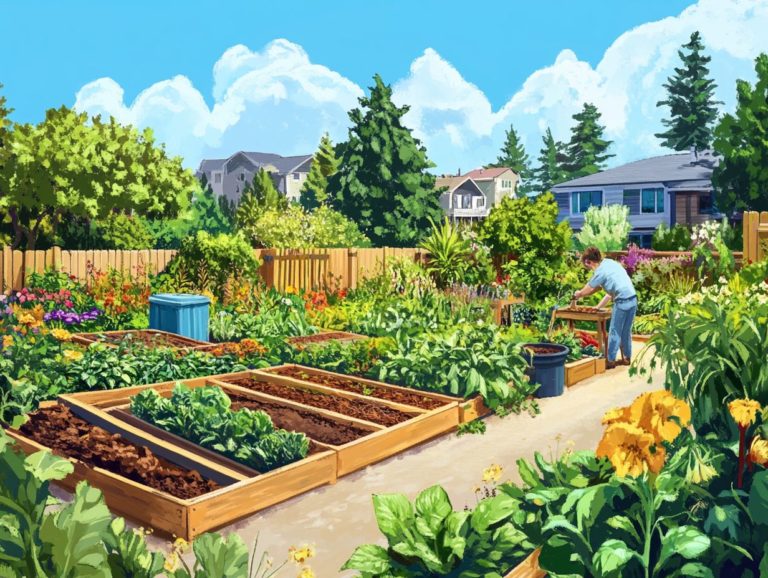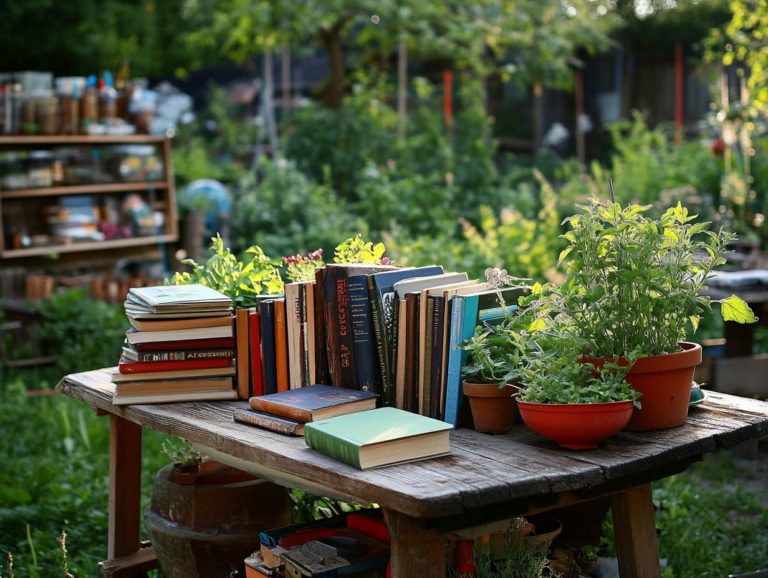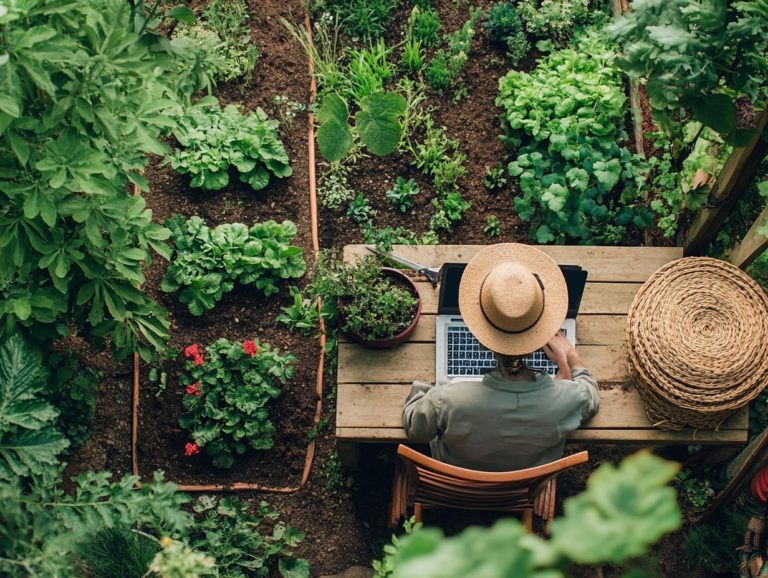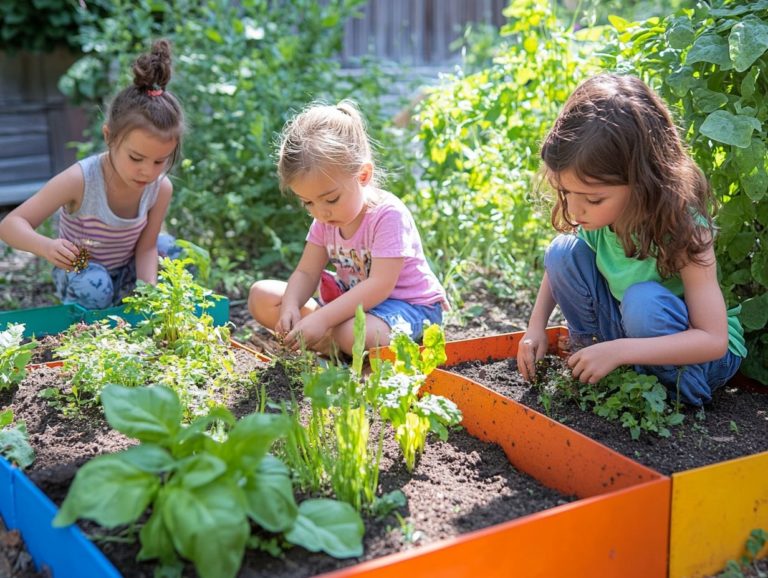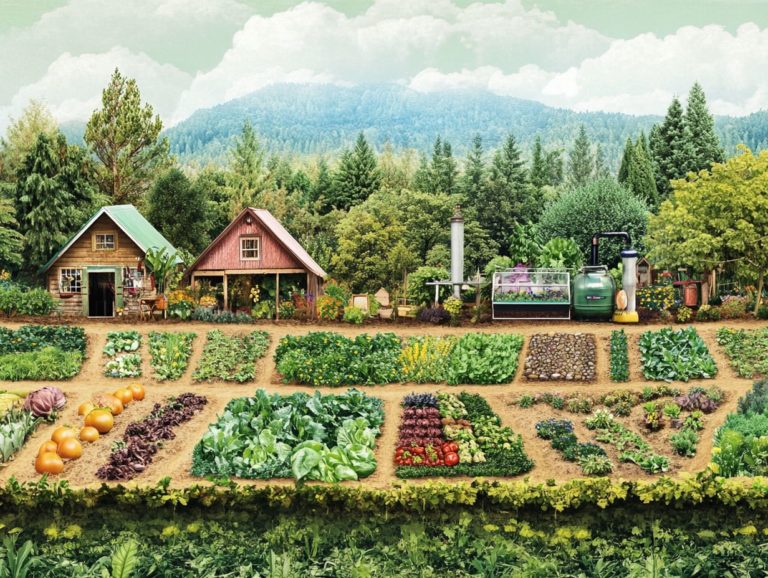How to Implement Sustainable Practices in Your Garden?
Sustainable gardening transcends mere trendiness; it stands as a crucial approach that enriches both the environment and your well-being. Discover the exciting fundamentals of sustainable gardening!
By adopting eco-friendly gardening practices, you can improve soil quality, conserve precious water, and promote biodiversity right in your backyard.
With actionable insights on composting, mulching, and maintaining a thriving garden ecosystem, including how to grow your own food, you ll find yourself inspired to create a greener, sustainable space.
Embark on this journey toward a flourishing garden that nourishes both nature and yourself.
Contents
- Key Takeaways:
- Why Sustainable Gardening Matters
- Starting with the Basics: Soil and Water
- Choosing Native Plants and Biodiversity
- Reducing Chemical Usage
- Practicing Sustainable Maintenance
- Frequently Asked Questions
- What are some ways to implement sustainable practices in your garden?
- How can I use organic fertilizers in my garden?
- Why is planting native species important for sustainability?
- How can I conserve water in my garden?
- Why is composting beneficial for sustainable gardening?
- What are some other sustainable practices I can implement in my garden?
Key Takeaways:
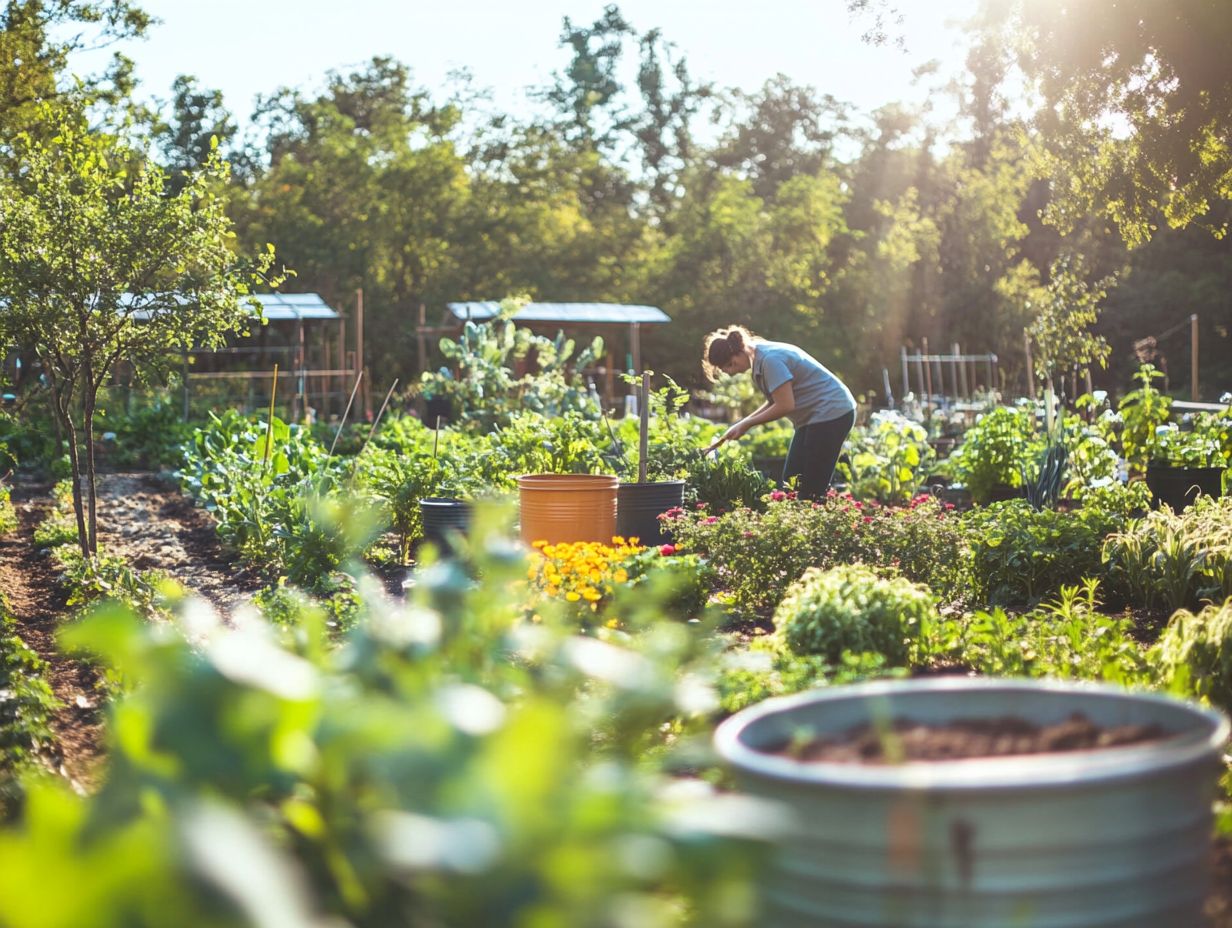
- Implementing sustainable practices in your garden benefits both the environment and your well-being.
- Improving soil quality and conserving water are key steps in maintaining a sustainable garden.
- Choose native plants and promote biodiversity to create a diverse and resilient ecosystem.
Why Sustainable Gardening Matters
Sustainable gardening isn’t just a passing fad; it’s an essential practice that creates a healthier environment, enhances biodiversity, and champions eco-friendly lifestyles. To learn more about this vital approach, explore the importance of sustainability in gardening.
By embracing sustainable gardening techniques, you can actively help reduce greenhouse gases and conserve precious water resources. This approach nurtures local ecosystems all while allowing you to reap the personal rewards of gardening.
Opting for native plants and natural methods is crucial for minimizing chemical usage while promoting robust soil health and efficient water conservation. This fosters vibrant wildlife habitats and strengthens community bonds through collaborative gardening projects.
Experts like Karen Weir-Jimerson and Bryan E. McCay lead these initiatives, inspiring others to join in.
Environmental and Personal Benefits
The benefits of sustainable gardening are remarkable, impacting both the planet and your well-being.
By prioritizing natural methods, you contribute to carbon sequestration (the process of trapping harmful CO2 from the atmosphere) and support local wildlife.
Connecting with nature enhances your mental health by alleviating stress and encourages physical activity through planting, weeding, and harvesting.
By cultivating fresh, organic produce, you improve your nutritional intake and overall quality of life. Sustainable gardening becomes a holistic approach to wellness that nurtures you and the environment.
Starting with the Basics: Soil and Water
Starting a successful sustainable gardening journey requires understanding soil health and water conservation. Good soil is the foundation of a thriving garden, and you can enrich it through composting and mulching.
Use these practices to enhance nutrient content and aid moisture retention. Conduct regular soil testing to inform your gardening practices and create optimal planting beds for diverse plants.
Implement efficient watering strategies, such as installing rain barrels, to dramatically reduce water waste and ensure your plants flourish even during dry spells.
Join the movement towards a sustainable future start your gardening journey today!
Tips for Improving Soil Quality
Improving soil quality is essential for cultivating a vibrant and productive garden. There are several effective strategies to enhance your nutrient-rich soil.
Incorporating compost significantly elevates the organic matter in your soil and fosters healthier microbial activity. Choosing organic fertilizers over synthetic ones nurtures soil life and ensures a steady release of nutrients.
Adopting techniques like crop rotation and mulching prevents nutrient depletion and suppresses pesky weeds. Starting a simple compost pile is a rewarding project; it reduces waste and enriches your garden over time.
With these practical approaches, you can cultivate a thriving, sustainable ecosystem regardless of your gardening experience.
Conserving and Managing Water Usage
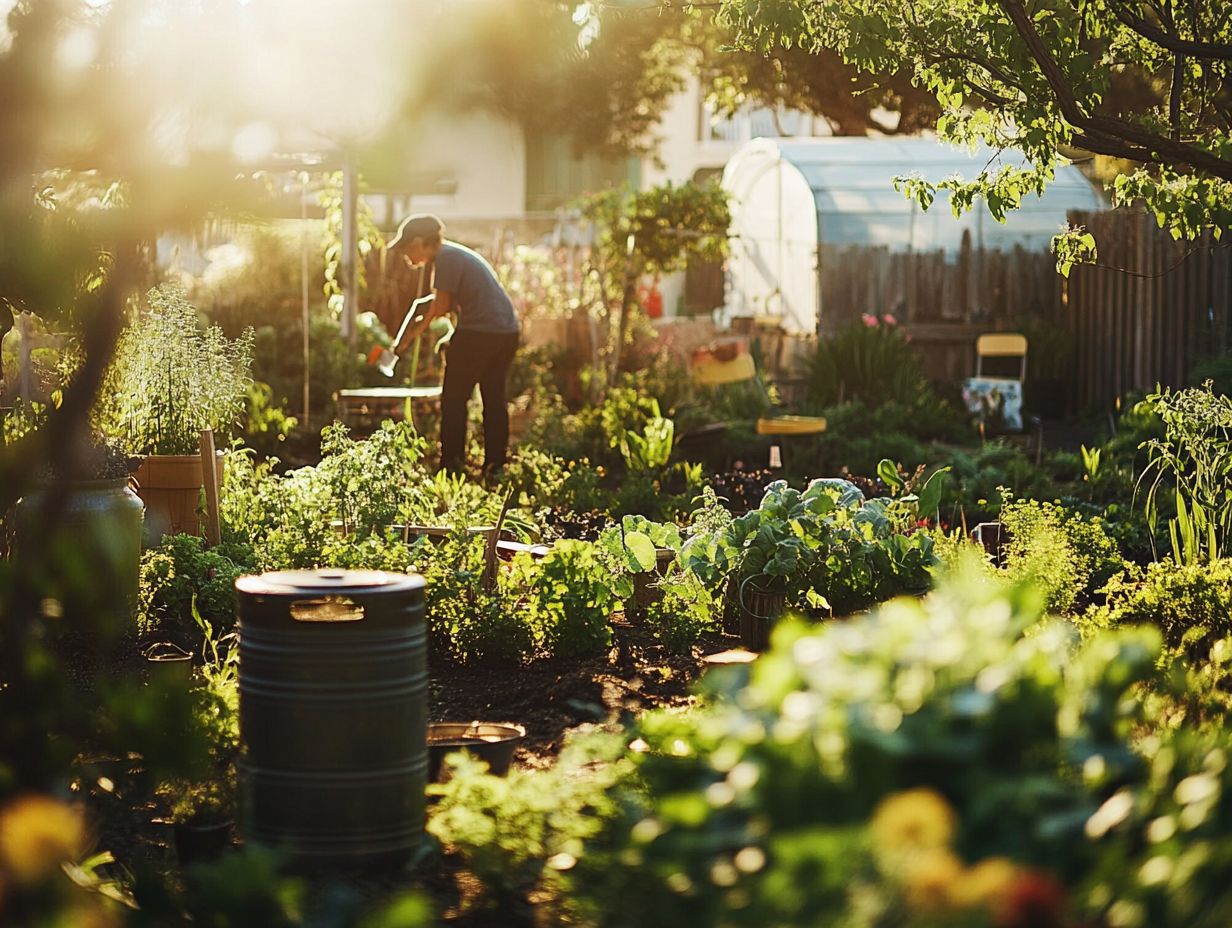
Conserving and managing water usage in your garden is crucial for sustainable gardening, especially in areas facing drought.
By using efficient watering techniques, such as drip irrigation systems, you can deliver water directly to the roots of your plants. This approach minimizes evaporation and runoff, ensuring that every drop counts.
Implementing landscaping that needs less water like incorporating native plants enhances your garden’s resilience while lowering overall water demand.
Consider integrating rain barrels to collect and store rainwater. This provides you with a free water source and helps reduce stormwater runoff, benefiting local ecosystems.
These strategies conserve a vital resource and promote healthier gardens while lowering utility bills, creating a win-win situation for you and the environment.
Choosing Native Plants and Biodiversity
Choosing native plants is essential for sustainable gardening. They enhance biodiversity and support local wildlife habitats.
Native plants adapt to your local climate and soil conditions, making them more resilient and requiring less maintenance than non-native species.
Incorporating native plants into your garden reduces the risk of invasive species taking hold and contributes to a balanced ecosystem, vital for fostering sustainability. These plants attract beneficial pollinators and enhance soil health, reinforcing the ecological integrity of your local area.
Benefits of Native Plants
Incorporating native plants into your garden offers a wealth of benefits for enhancing the local ecosystem and fostering biodiversity.
These plants attract pollinators like bees and butterflies, essential for the reproduction of many flowering species. By cultivating an inviting environment, you support local wildlife, providing essential habitats and food sources.
Native plants, uniquely adapted to your local climate and soil, often require less water and fewer resources than their non-native counterparts. This resilience minimizes your maintenance efforts and contributes to ecosystem stability, promoting a balanced environment where wildlife can thrive.
Creating a Diverse Ecosystem
Creating a diverse ecosystem in your garden is paramount for fostering biodiversity and ensuring the vitality of your soil.
Incorporate a wide variety of native plant species that serve as habitats and food sources for local wildlife, including essential pollinators like bees and butterflies.
Enhancing your garden as a wildlife sanctuary is easy; add birdhouses, bat boxes, and native shrubs to encourage a diverse array of species.
By employing sustainable gardening practices like composting, natural pest control, and water-saving techniques in gardening, you help maintain ecological balance, cultivating an environment that nurtures both plant and animal life.
Prioritizing this diversity enriches your garden and contributes to a resilient ecosystem capable of withstanding environmental changes.
Start implementing these practices today for a healthier garden!
Reducing Chemical Usage
Reducing chemical usage in your gardening endeavors is essential for fostering a healthy environment. Fortunately, a wealth of organic solutions exists to help you achieve this noble goal.
Alternatives to Pesticides and Fertilizers
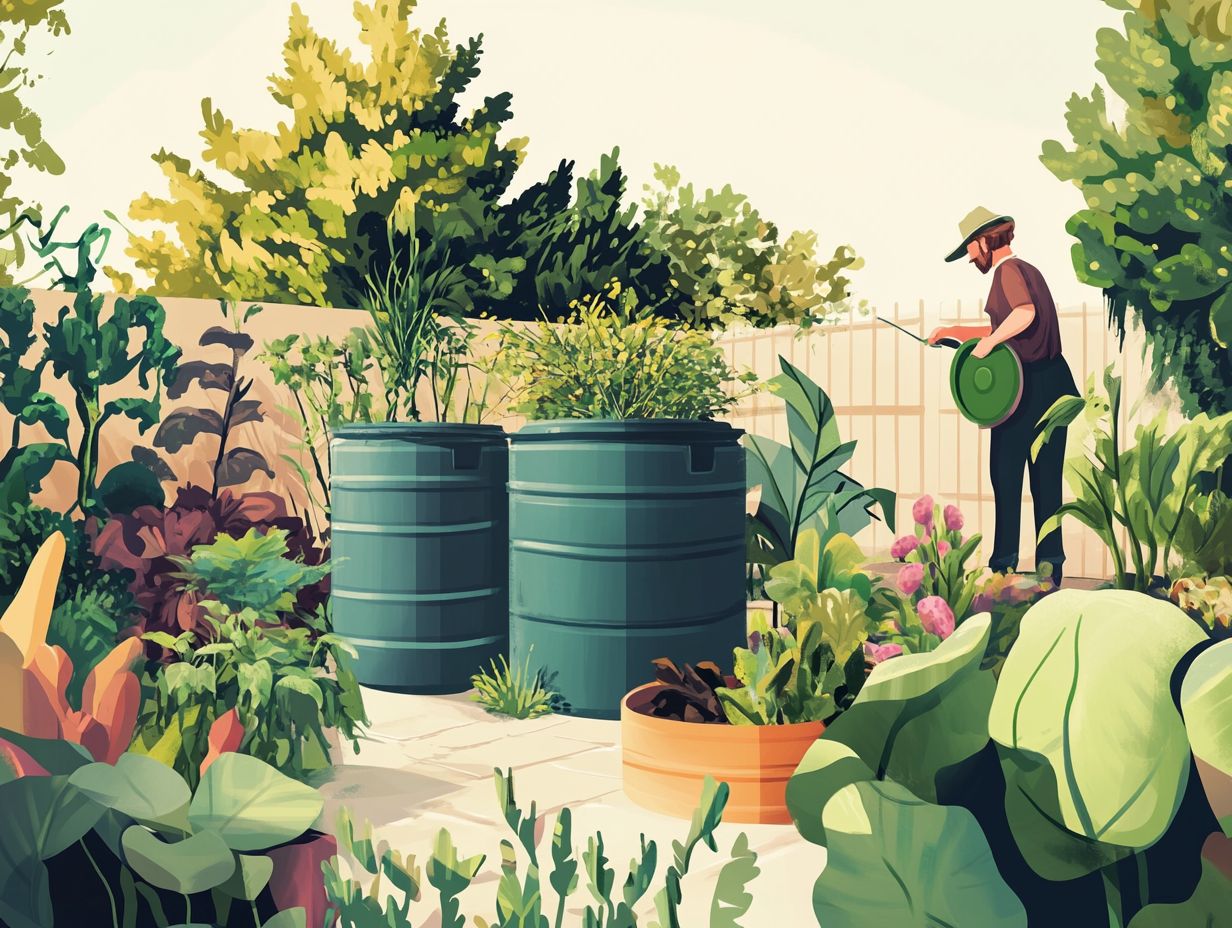
Exploring alternatives to traditional pesticides and fertilizers is a crucial step towards sustainable gardening. This shift leads to healthier plants and thriving ecosystems. Many gardeners are now using organic solutions that reduce chemical runoff, enrich the soil, and enhance biodiversity in yards and community green spaces.
Natural pesticides, like neem oil and diatomaceous earth (a natural pest deterrent made from tiny fossilized sea creatures), effectively deter pests while ensuring the safety of beneficial insects. Incorporating compost and organic fertilizers nourishes your soil with essential nutrients, promoting robust plant growth.
By cutting back on synthetic products, you cultivate a healthier environment that supports pollinators and other wildlife. This creates a vibrant habitat for all forms of life. The advantages of using organic alternatives extend beyond immediate pest control; they build resilience in your plants against diseases while protecting the surrounding ecology.
Embracing these holistic practices invites a new generation of gardeners who prioritize sustainability and foster a harmonious balance between human activity and nature.
Practicing Sustainable Maintenance
Sustainable maintenance is the key to a thriving garden! By integrating methods like composting and mulching, you can significantly enhance soil health while reducing waste. For more insights, explore what are the key factors for sustainable gardening.
This approach nurtures your plants and contributes to a healthier ecosystem.
Composting and Mulching
Composting and mulching are essential techniques in organic gardening that significantly enhance soil health and help you reduce waste.
Transforming your kitchen scraps and yard debris into rich organic matter keeps waste out of landfills and infuses your soil with vital nutrients. Mulching acts as a protective blanket for your garden, regulating temperature, retaining moisture, and preventing pesky weeds. By implementing these practices, you elevate your garden’s soil structure, promoting better drainage and aeration.
If you’re eager to get started, crafting a simple compost bin from pallets is a great option. You can also use organic materials like leaf litter or grass clippings to create effective mulch.
These sustainable practices enhance plant health and productivity, nurturing a balanced ecosystem and making a positive impact on your gardening endeavors.
Managing Garden Waste
Managing garden waste effectively is essential for reducing overall waste and promoting sustainable gardening practices.
By adopting strategic approaches, you can transform what would typically be discarded into valuable resources. Composting enriches your soil and significantly cuts down on organic waste that ends up in landfills. Recycling plant materials ensures that various components of your garden are repurposed, allowing them to fulfill multiple roles throughout your gardening journey.
Embracing techniques that prioritize waste reduction, such as careful planning of plant selections and maintaining a balanced garden ecosystem, leads to a healthier environment. For more insights, check out the best practices for organic gardening to enhance your sustainable gardening experience.
Frequently Asked Questions
What are some ways to implement sustainable practices in your garden?
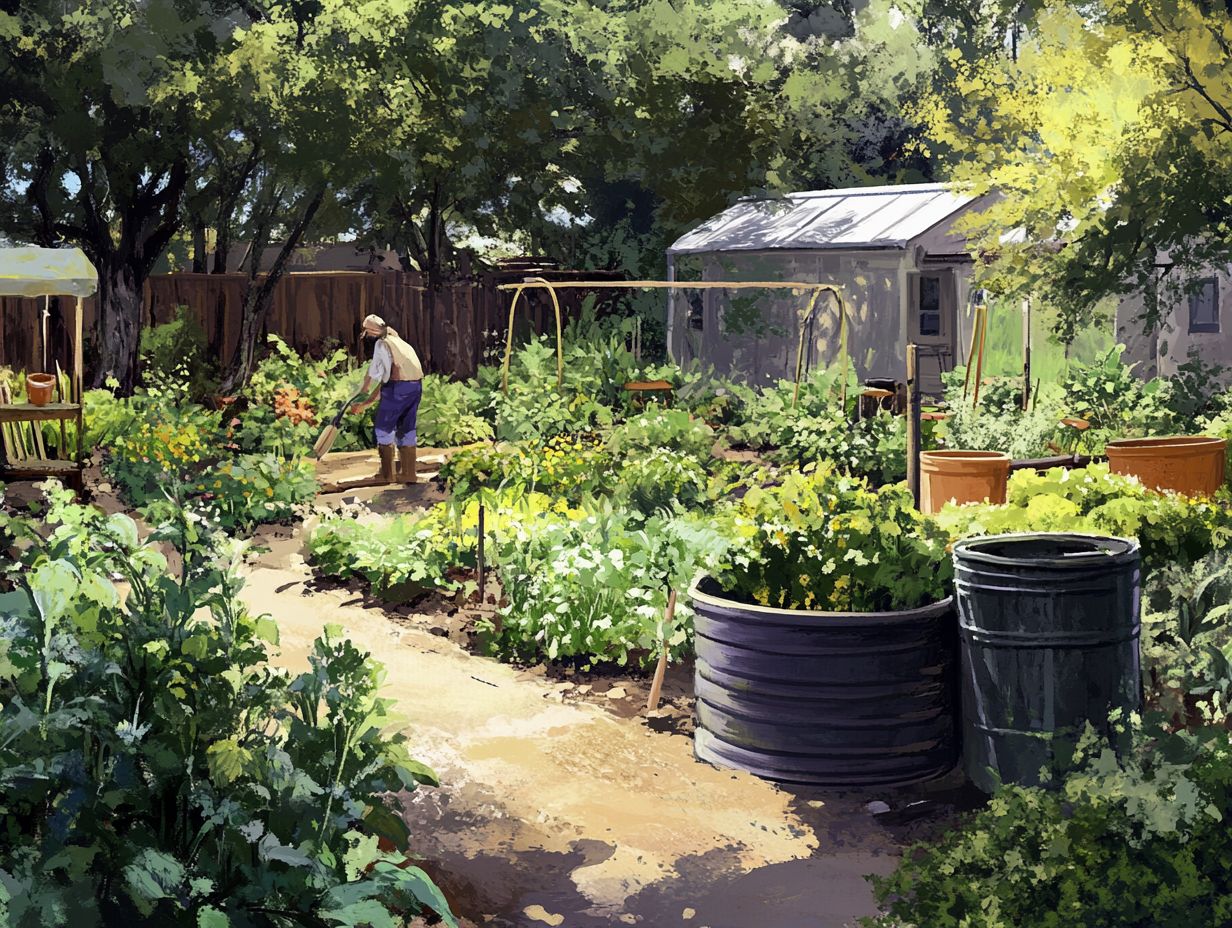
Some ways to implement sustainable practices in your garden include using organic fertilizers, planting native species, conserving water, and how to implement sustainable soil practices such as composting.
How can I use organic fertilizers in my garden?
Organic fertilizers, such as compost, manure, and worm castings, provide essential nutrients to your plants without harmful chemicals. You can make your own organic fertilizer or purchase it from a local supplier.
Why is planting native species important for sustainability?
Native plants thrive in our local climate and require less water, which is great for your garden and the planet!
Plus, they offer food and shelter to our valuable wildlife.
How can I conserve water in my garden?
Use a drip irrigation system, mulch, and collect rainwater. These methods help reduce water usage and save money.
Why is composting beneficial for sustainable gardening?
Composting recycles organic waste from your kitchen and garden. This reduces landfill waste and enriches the soil.
Healthy soil improves plant health and lowers the need for chemical fertilizers.
What are some other sustainable practices I can implement in my garden?
Use organic fertilizers and plant native species. You can also conserve water and compost.
Consider crop rotation, natural pest control, and limiting plastic materials in your garden.

